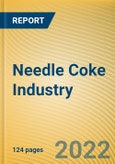Needle coke that features low resistivity and strong resistance to impact and oxidation has found broad application in ultra-high-power graphite electrodes, nuclear reactor moderating materials and lithium battery anode materials among others. In recent years, the boom of new energy vehicles and the increase of electric furnace equipment, a result of China government’s greater efforts to make use of steel scraps have given a big boost to the demand for needle coke and the production. China's needle coke production capacity was expanded from 160 kt/a in 2014 to 2,180 kt/a in 2021, and the production multiplied from 80 kt in 2016 to 762 kt in 2021. The global and Chinese new energy vehicle industries will still gain momentum in the next five years. China's benign resource recycling policies will continue to expedite the development of electric furnace equipment. It is conceivable that China will produce 3,458 kt needle coke in 2027, sustaining CAGRs of 28.7% during 2021-2027.
Needle coke falls into coal-based and petroleum-based types. Needle coke made from petroleum residue is petroleum-based needle coke; that produced from coal tar pitch and fractions is coal-based needle coke. European and American producers concentrate on producing petroleum-based needle coke, while their Asian peers are engaged in coal-based needle coke. The constrained supply of raw materials brought about the rapid development of coal-based needle coke in China in recent years. In 2021, China’s coal-based needle coke capacity reached 1,000kt/a, and the output was 261 kt; the petroleum-based needle coke capacity was 1,180 kt/a, and the output was 501 kt.
In terms of competitive landscape, global needle coke producers cluster in the US, Japan and China. Among them, Phillips 66, a spin-off from ConocoPhillips, is the world's largest producer of petroleum-based needle coke, with production capacity of about 450 kt/a; Shandong Yida New Material Co., Ltd. and Shandong Jingyang Technology Co., Ltd. have seen surging capacity in recent years, each with 180 kt/a, tied for the second largest needle coke producer in the world; Shanxi Hongte Coal Chemical Industry Co., Ltd. and Shandong Yiwei New Materials Co., Ltd. surpassed Nippon Steel Chemical (formerly C-Chem) and became the world's largest (joint) coal-based needle coke producer, with capacity of 150 kt/a. In addition to the above-mentioned producers, other Chinese players have also increased their investments in recent years. The capacity of Tangshan Dongri New Energy Materials Co., Ltd., Zaozhuang Zhenxing Carbon Material Technology Co., Ltd., and Kaifeng Pingmei New Carbon Materials Technology Co., Ltd. and more has increased significantly in recent years.
Needle coke, the main raw material for lithium battery anode materials, is greatly affected by the demand for lithium batteries. In 2020, the demand for needle coke for anode materials in China reached 190 kt, a figure projected to hit 1,900 kt in 2026.
Global and China Needle Coke Industry Report, 2022-2027 highlights the following:
- Needle coke (definition, classification, main models, development history, etc.)
- Global needle coke industry (supply and demand, technology, competitive pattern, etc.)
- China needle coke industry (development environment, supply and demand, competitive pattern, import and export, etc.)
- Main downstream sectors (graphite electrode) of needle coke (production, demand, market pattern, etc.)
- 7 global and 16 Chinese needle coke producers (operation, revenue structure, needle coke business, etc.).
This product will be delivered within 3-5 business days.
Table of Contents
Companies Mentioned
- Phillips 66
- Nippon Steel Chemical & Material (NSCM)
- GrafTech International
- Mitsubishi Chemical
- ENEOS
- Petrocokes Japan Limited
- Posco Chemtech
- Fangda Carbon New Material Technology Co., Ltd.
- Qitaihe Baotailong Coal&Coal Chemicals Public Co., Ltd.
- Shandong Yida New Material Co., Ltd.
- Kaifeng Pingmei New Carbon Materials Technology Co., Ltd.
- Anshan Zhongte New Material Technology Co., Ltd.
- Henan Shoucheng Technology New Material Co., Ltd.
- Jinzhou Petrochemical Co., Ltd.
- Baowu Carbon
- Bora Bioenergy
- Shandong Jingyang Technology Co., Ltd.
- Risun Holdings
- Pingdingshan Xuyang Xingyu New Materials Co., Ltd.
- Henan Baoshun Fine Chemical Co., Ltd.
- TSDR New Energy Materials Co., Ltd.
- Zaozhuang Zhenxing Carbon Material Technology Co., Ltd.
- Anhui MaSteel Chemical Energy Technology Co., Ltd.
- Shanxi Hongte Coal Chemical Industry Co., Ltd.
Methodology

LOADING...








